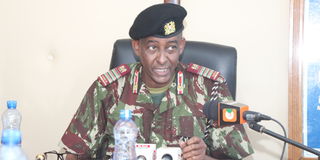State enhances security in the Rift Valley ahead of elections

Rift Valley Regional commissioner Maalim Mohamed speaking to journalists in Nakuru on August, 8, 2022
What you need to know:
Mr Maalim asked Kenyans to maintain peace during and after the polls
The government has scaled up security surveillance in various parts of the expansive Rift Valley region, including in banditry-prone areas, ahead of Tuesday’s General Election.
In an interview with the Nation yesterday, Rift Valley Regional Commissioner Maalim Mohamed assured residents that their safety would be guaranteed before, during and after the polls.
“We are set and ready for Tuesday’s elections. I want to assure residents of the Rift Valley region that security has been beefed up and our officers will be ready to respond swiftly to any concern. The government is determined to ensure the election period is peaceful,” said Mr Mohamed.
“An election is a one-day affair. Everyone must be allowed to exercise their democratic right peacefully without blackmail, threats or violence. We will do everything to prevent election-instigated violence.”
Mr Mohamed said a multi-agency command centre was established last week at the Rift Valley regional headquarters in Nakuru to coordinate responses to issues arising from the polls.
“The command centre will help security officers to respond swiftly to any incidents during the election period. We have provided hotline numbers that citizens can use to report incidents from across the 14 counties of the region,” he said.
The regional commissioner also said more security officers, including the dreaded GSU, had been deployed to volatile areas of Samburu, Baringo, Laikipia and Elgeyo Marakwet to protect residents.
But there was a security scare on Sunday in Maralal, Samburu County, after a watchman at African Inland Church Moi Girls School was shot dead by armed bandits.
Samburu County Police Commander David Wambua said the bandits stole 11 cattle from the school.
Mr Wambua told the Nation that police officers were pursuing the criminals.
"Armed gunmen stormed the school with the intent of stealing cattle. They managed to drive them away and killed the night guard in the incident," Mr Wambua said.
Moi Girls is among schools set to be used as polling centres on Tuesday and was a training centre for poll workers and election observers.
"We have beefed up security following the incident. We are not going to relent until we apprehend the attackers, who I am sure are living amongst us," said the police boss, asking residents to be calm.
He appealed to residents to provide information that could help police arrest the criminals.
Moi Girls Principal Alice Gituro said the school had not witnessed insecurity previously and the killing shocked the community.
In Nakuru County, additional security personnel were deployed to Molo, Kuresoi South, Kuresoi North and Njoro.
In Molo town and Chepkeneio and Kamwaura centres in Kuresoi North, dozens of police lorries, armed personnel and water cannons were spotted on Sunday as the General Service Unit (GSU) and other police service units were deployed mainly to election violence hotspots in the region.
GSU officers in a lorry patrolled as residents went about their business.
An officer, who spoke on condition of anonymity, revealed that they were deployed on Wednesday and were driving around to familiarise themselves with the area ahead of the elections.
“We have been here since Wednesday. We will be here for at least 10 days until the elections are completed. We are here to respond to any security needs,” said the officer.
The officers are operating from several police stations, including Kamwaura, Molo, Njoro and Keringet, where they have set up camps, with a multi-agency command centre at the regional police headquarters in Nakuru City.
“We want to ensure there is enough security. We are not here to scare them, we just want to ensure that the region is peaceful and protect citizens during the election period," the officer added.
Meanwhile, residents have lauded the government’s move to deploy more security personnel ahead of Tuesday’s polls.
Ms Jackline Kemunto, a resident of Kuresoi North, said the presence of officers had restored calm among locals, saying that they will now cast their votes in confidence.
Ms Kemunto said some residents had planned to move out to “safer” areas but were assured they and their property would be safe.
"The officers have been here for two days now. We are happy that they were deployed here. We were in fear but now everyone is going about their business as we wait to cast our votes," said Ms Kemunto
Mr Leonard Koech, a bodaboda operator, called on young people to desist from being used to cause chaos during polls, saying that politicians do it for their selfish interests
"We want to come out in large numbers and elect our leaders peacefully. As much as we laud their deployment, we want to ask them not to use force while doing their work,” said Mr Koech.
Interior Cabinet Secretary Fred Matiang’i last week assured Kenyans that the government was ready and prepared to offer adequate security before, during and after the polls.
Dr Matiang’i, who spoke in Molo, also announced the deployment of additional security in parts of Eldoret and in Molo and Kuresoi.
Sources told the Nation that the decision to beef up security in Eldoret, Molo, Njoro, Kuresoi South and Kuresoi North was informed by previous election violence and intelligence briefs.
In Laikipia, police officers, including from the GSU, have heightened security in banditry-prone and volatile parts of the county.
County Commissioner Joseph Kanyiri told the Nation that additional officers had been deployed to Kirima sub-county, which comprises Ol Moran, Sossian and Githiga wards.
“More security officers have already been deployed to the insecurity-prone areas neighbouring Ol Moran ward to ensure that peace prevails before, during and after the August 9 polls,” Mr Kanyiri said.
Security agencies are on high alert and are ready to protect voters and election materials.
By Joseph Openda, Eric Matara, Geoffrey Ondieki, Mercy Koskei and Steve Njuguna





